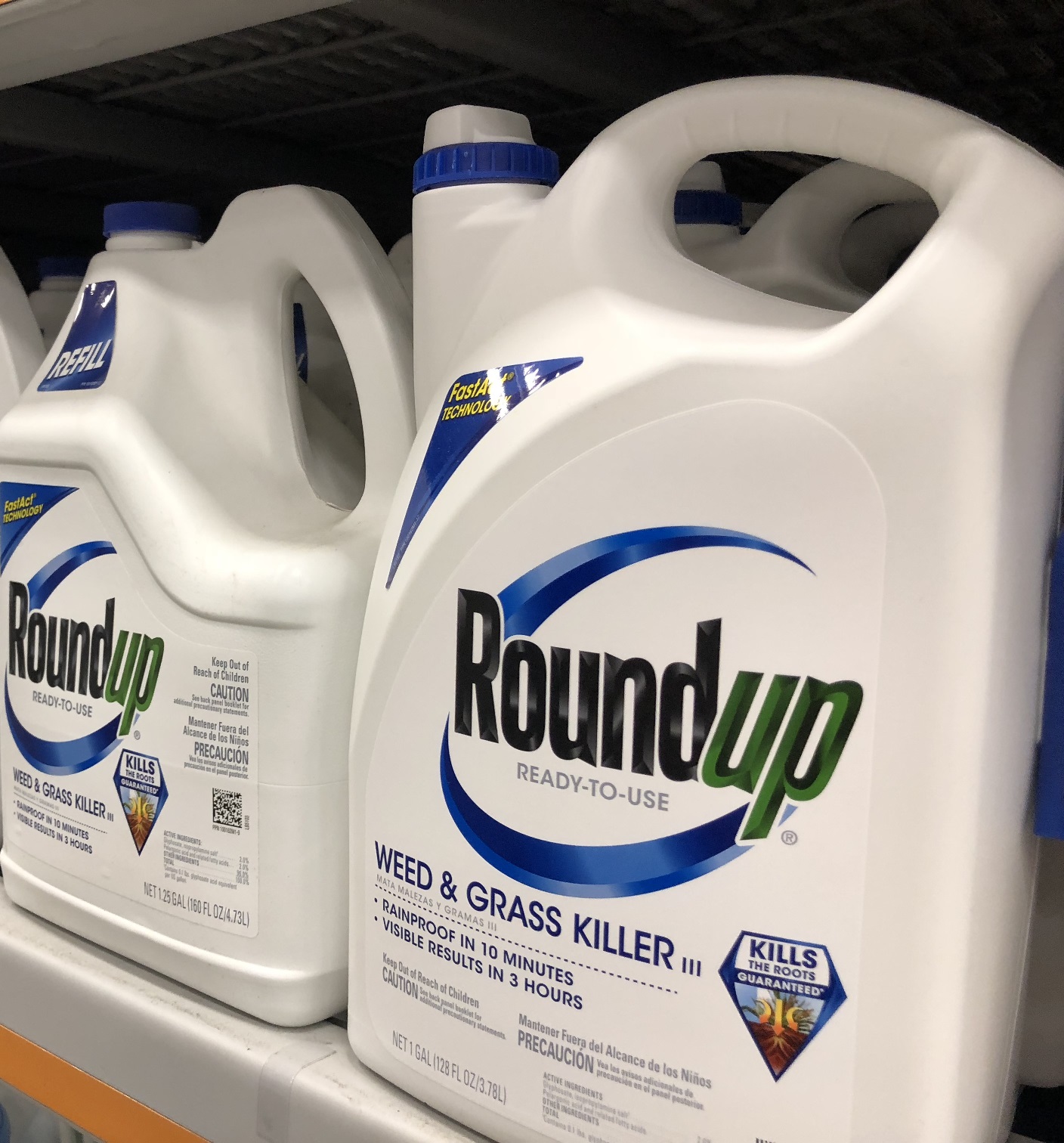ROUNDUP

The Rise of Roundup: A Brief History
Monsanto introduced Roundup in the 1970s, and it quickly became a game-changer in the agricultural industry. Its active ingredient, glyphosate, was praised for killing weeds without harming genetically engineered crops to resist it. This innovation led to increased agricultural productivity and reduced labor costs, as farmers could manage weeds more efficiently. The herbicide’s popularity soared, and it became a household name, used in agriculture and residential gardening, and landscaping.
Despite its initial success, Roundup’s widespread use raised environmental and health concerns. Studies began to emerge suggesting a potential link between glyphosate and various health issues, including cancer. These findings sparked debates and led to increased scrutiny from regulatory bodies worldwide.
As more research surfaced, the narrative surrounding Roundup shifted from agricultural advancement to public health concern.
The Legal Landscape: Roundup Mass Torts
The legal challenges surrounding Roundup have primarily focused on claims that exposure to glyphosate can cause cancer, particularly non-Hodgkin lymphoma. As scientific studies and anecdotal evidence accumulated, individuals who believed their health had been adversely affected by Roundup began to seek legal recourse.
The mass tort litigation against Monsanto, now owned by Bayer, gained momentum in the late 2010s.
Unlike class action lawsuits, mass torts allow each plaintiff to maintain an individual claim while benefiting from shared resources and consolidated legal strategies. This approach has been instrumental in holding large corporations accountable for widespread harm.
One of the most significant cases in the Roundup mass tort saga was the 2018 verdict in favor of Dewayne Johnson, a former school groundskeeper who developed non-Hodgkin lymphoma after using Roundup.
The jury awarded Johnson $289 million, a decision that was later reduced but marked a turning point in the legal battle against Monsanto. This case set a precedent and encouraged other plaintiffs to come forward with similar claims.
Verdicts and Settlement Value
The Roundup trials have been an enormous success, far exceeding even the most optimistic expectations.
These victories hold Monsanto accountable for its choices by awarding victims large payouts, including punitive damages. When a class-action multidistrict litigation (MDL) involving a product like Roundup is filed, the first trial results are frequently used to negotiate a global settlement for all subsequent lawsuits.
The initial Roundup trials yielded significant verdicts for plaintiffs, which helped shape the settlement amounts in subsequent cases. A tiered point system is used to determine the value of these settlements, with each point corresponding to a specific monetary value.
Those who faced regular exposure to Roundup, such as landscapers and agricultural workers diagnosed with non-Hodgkin lymphoma after years of daily use, typically fall into the higher tiers. In contrast, individuals with less exposure, like homeowners who used Roundup infrequently or those with other types of lymphoma not directly associated with the herbicide, are placed in lower tiers.
For the first group of settlements, average awards ranged from $120,000 to $180,000.
However, it is anticipated that future lawsuits may result in even higher compensation amounts as awareness and legal scrutiny continue to grow.
Will I Qualify for a Roundup Lawsuit?
If you’re a farmer, landscaper, or other agricultural worker who used Roundup or was exposed to it, you could be eligible to join a lawsuit. Additionally, if you are or were suffering from non-Hodgkin lymphoma, whether or not you’ve sought or are receiving treatment, you could also have grounds to sue.
There are many illnesses connected to Roundup, but cancer is the deadliest. Non-Hodgkin lymphoma and leukemia are known to be the most common. Approximately 70,000 people in the United States are diagnosed with non-Hodgkin lymphoma annually.
Symptoms of Non-Hodgkin Lymphoma
If you used Roundup frequently and have experienced the following symptoms, it’s crucial to see a doctor as soon as possible:
- Loss of appetite
- Swollen lymph nodes
- Stomach and chest pain
- Fever
- Night sweats
Landscapers, farmworkers, and nursery and garden center employees are most at risk. They can inhale the herbicide when mixing, spraying, or cleaning up. Roundup can also harm people who eat or drink contaminated food or water. If you believe you qualify for a Roundup lawsuit, contact us to discuss your situation.

What Compensation Can I Expect in a Roundup Lawsuit Verdict?
Depending on your specific circumstances, you may be able to seek compensation for various damages, including:
- Past and future medical expenses resulting from your cancer.
- Past and future pain and suffering connected to your illness.
- Lost salaries, wages, or commissions.
- Other economic losses resulting from your illness and treatment.
- Punitive damages aimed at holding the company accountable for its negligence.
What Proof or Information You'll Need
If you or someone you care about has been diagnosed with a health issue after being exposed to Roundup, it’s crucial to act quickly. Time is of the essence when it comes to filing a claim against Monsanto. Understanding what proof you need can make a big difference in your case.
Key Factors That Can Impact Your Claim
Proof of Monsanto’s Failure to Warn
One of the main arguments in many lawsuits against Monsanto is that the company didn’t adequately warn consumers about the potential health risks associated with glyphosate. To strengthen your case, you’ll need to show that Monsanto failed to provide proper warnings about the dangers of using their product. This could involve gathering evidence of past claims or studies that highlight their negligence. Your attorney can help you dig into this information and build a solid argument.
Evidence of Negligent Product Design
In addition to warning failures, you’ll also need to demonstrate that Monsanto was negligent in designing Roundup. This means showing that the product was inherently unsafe and that this design flaw contributed to your health issues. Again, your attorney will be invaluable in helping you gather the necessary evidence to support this claim.
Proof of Your Roundup Use
It’s essential to provide clear evidence that you were exposed to Roundup. This could include receipts from purchases, empty bottles, or even invoices from landscaping services that used the herbicide. If you were exposed at work, standard operating procedures or records from your employer can also be helpful. The more documentation you have, the stronger your case will be.
Length and Degree of Exposure
The amount of time you were exposed to Roundup can significantly impact your claim. If you worked in an environment where you used Roundup regularly—like a farm or landscaping business—you may have a stronger case than someone who only used it occasionally. Courts often look favorably on those with prolonged exposure, so be sure to document how often and for how long you used the product.
Timing of Diagnosis
Another important factor is the time between your exposure to Roundup and your diagnosis. This period, known as the latency period, is crucial because certain health issues, like lymphoma, can take years to develop. Research suggests that high-dose exposure can lead to a diagnosis after at least two years. Make sure to keep track of when you were exposed and when you received your diagnosis.
Linking Exposure to Your Illness
To win your case, you’ll need to establish a clear link between your Roundup exposure and your health condition. This often requires scientific evidence that supports your claim. Your attorney can help you find studies or expert testimonies connecting glyphosate exposure to your illness.
Other Health Factors
Lastly, it’s important to consider any other health issues you may have. Conditions like smoking, previous cancer diagnoses, or other illnesses can complicate your case. These factors might affect your chances of receiving compensation, so be prepared to discuss your complete medical history with your attorney.
How Legal Support Law Can Help
Legal Support Law assists individuals affected by harmful products like Roundup. Our team of experienced attorneys understands the complexities of product liability claims and is committed to helping you navigate the legal process.
We can connect you with legal professionals who will evaluate your case, gather the necessary evidence, and advocate for your rights. With our support, you can focus on your recovery while we work diligently to secure the compensation you deserve for your exposure to glyphosate and its associated health risks.
What You Need to Know About the Roundup Lawsuit Settlement Process
These lawsuits use a point-scoring system to determine an appropriate settlement amount for each eligible claimant. The system ranks cases in settlement tiers, and since various factors determine the rankings, payouts for the Roundup lawsuit are complex.
Claimants who join the lawsuit settlement do not receive the same amount. Among the factors that the ranking system investigates are:
- The type of cancer; non-Hodgkin’s lymphoma is the most common cancer linked to Roundup exposure.
- The stage and degree of cancer.
- The victim’s age at the time of diagnosis.
- The type and degree of exposure to Roundup.
- The length and severity of treatment.
Once the system assigns point scores to individual cases, it groups them into settlement tiers, allowing groups with higher scores to receive larger payouts. Consequently, groups with lower scores get lower payouts.
Common Damages That Affect the Average Payout
Your average payout in the Roundup lawsuit will depend on the nature and extent of injuries you sustained.
Here are the common types of damages with their respective impacts on the value of your payout:
- Past and Future Medical Expenses: If you incurred any medical expenses to treat a health problem caused by exposure to Roundup, it might affect your payout value. The same applies to future expenses needed to treat the health problem. Properly documenting these costs is essential to use them as evidence in the lawsuit.
- Reduced Earning Capacity and Loss of Income: Having a reduced earning capacity or taking time off work due to an illness brought on by Roundup can help determine the payout. In this case, your lawyer will consider this economic impact in damages calculations.
- Pain and Suffering: Even though they are hard to quantify, pain and suffering are essential in payout calculations. They encompass shock, emotional distress, anger, sleeplessness, anxiety, and emotional distress caused by the Roundup-related illness.
Conclusion
The legal challenges surrounding Roundup highlight the importance of holding corporations accountable for the safety of their products.
As mass tort litigation continues to evolve, it serves as a powerful tool for individuals seeking justice and compensation for harm caused by corporate negligence. By taking informed action and seeking expert legal guidance, you can navigate the complexities of mass tort litigation and work toward a resolution that addresses your needs and concerns.
If you or someone you know has been impacted by Roundup, don’t hesitate to reach out to Legal Support Law. Our dedicated professionals are here to support you in your pursuit of justice and ensure your voice is heard in the ongoing fight for accountability and safety.

Roundup Lawsuit FAQs
What health risks are associated with Roundup?
Research has linked glyphosate, the active ingredient in Roundup, to an increased risk of several health issues, most notably non-Hodgkin lymphoma.
Other potential health risks include reproductive issues and endocrine disruption, although the evidence is still being evaluated.
How many people have filed lawsuits against Monsanto for Roundup-related health issues?
As of now, over 40,000 individuals have filed lawsuits against Monsanto, claiming that their exposure to Roundup has led to serious health problems. These lawsuits allege that the company failed to warn consumers about the risks associated with glyphosate.
What is the process for filing a Roundup lawsuit?
Filing a Roundup lawsuit typically involves consulting with an attorney who specializes in mass torts. They will help you gather necessary evidence, assess your eligibility, and guide you through the legal process, including filing your claim and potentially participating in settlement negotiations or trial.
How can I prove that my cancer is linked to Roundup exposure?
To establish a link between your cancer and Roundup exposure, you will need to provide evidence of your exposure history, medical records documenting your diagnosis, and potentially expert testimony linking glyphosate to your specific type of cancer. Your attorney can assist you in gathering this evidence.
What types of compensation can I expect from a Roundup lawsuit?
Compensation can vary widely based on individual circumstances but may include medical expenses, lost wages, pain and suffering, and punitive damages. Depending on the severity of the case, the average payout for Roundup lawsuits has ranged from $120,000 to $180,000.
Is there a deadline for filing a Roundup lawsuit?
Yes, there are deadlines known as statutes of limitations that dictate how long you have to file a lawsuit after being diagnosed with a related illness. These deadlines vary by state, so it’s important to consult with an attorney as soon as possible to ensure your rights are protected.
